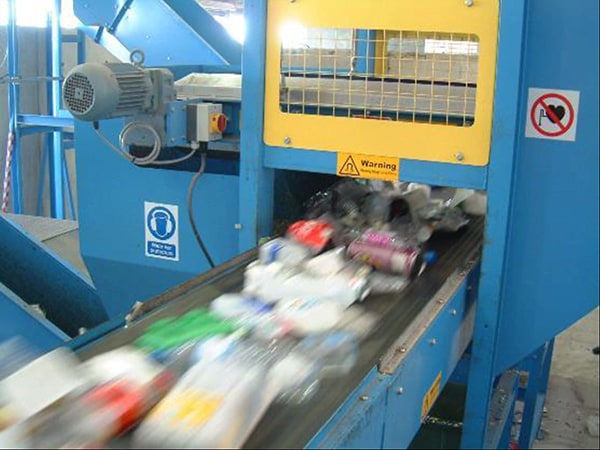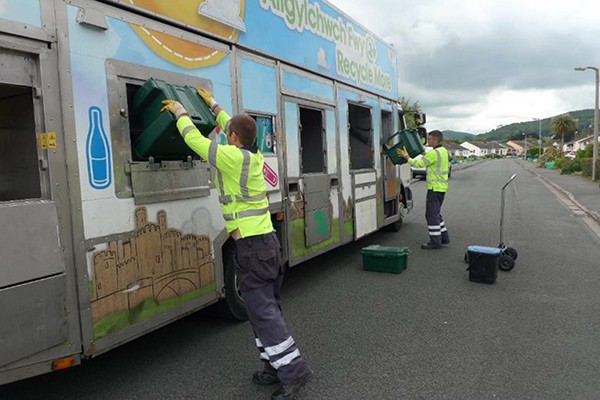MRF operators are running sorting belts at slower speeds to improve material-sort quality in response to tougher quality demands from end-users.
This is according to Adam Read, the director of external affairs at recycling and waste firm Suez, who was speaking at a Green Alliance event looking at the impact of China’s National Sword Initiative on waste in London yesterday (24 January).

Mixed materials being sorted at a MRF
The session heard that exports of recyclable waste – in particular plastic – from the UK and other European countries to China had grown significantly since the early 2000s, with the country becoming the largest single importer of waste material.
However, demand has dropped significantly since the implementation of China’s National Sword policy, which has placed strict conditions on the quality of material accepted for recycling, including paper, metals and plastics.
Markets
Dr Read admitted that the tougher trading conditions in recycling markets, including in Europe where Suez moves much of its material, has squeezed profit margins for MRF operators seeking to keep up with higher quality specifications demanded by end-users.
But, this has not, he said, been coupled with an improvement in quality of material coming into facilities, despite increased media coverage of issues relating to waste and recycling contamination.
He added that a greater emphasis was needed on material collected at the kerbside, suggesting that councils moving to kerbside-sort collections systems, for example, would help to improve material quality.
He said: “[In the UK] I’ve not seen a quality shift in the last 12 months because of David Attenborough and all of the coverage. I still think the public is putting out what they think is right, that is not what they are being asked to put out. We have seen some local authorities restrict some materials because they can’t handle it.
“We are getting a lot of contamination at our sites, and I do think that the answer is kerbside sort and source segregation. If we want quality material then we have got to do it at source, but that is a journey we are going on.”
‘Slow-down’
Questioned on how waste management firms had responded to the changes in the market over the last 18 months, he said: “What the waste and resources sector have been doing this year: we’ve been slowing down our MRFs.”
“I still think the public is putting out what they think is right, that is not what they are being asked to put out. We have seen some local authorities restrict some materials because they can’t handle it.”
Dr Adam Read
Suez
“We will slow down the belts, we will change the sorting equipment to recognise the key polymers. We will put more pre-sort on at the front end to capture the heavily contaminated loads and then we enter dialogue with our customers about where they are coming from, which crew areas, which particular businesses.”
Dr Read was questioned on whether MRFs could continue to operate profitably in the long term, in light of increasing pressure on margins.
He responded: “We constantly battle with the margins on MRFs, it is not a high value business. Certainly with the way that the international markets are at the moment it is not good fun.
“In reality, we don’t want to be doing too much of the slowing or too much of the stockpiling or re-running lines, you are eating into very low margins if at all. On some of our local authority contracts there is nothing in them, we are moving material for the sake of moving material, but we are ticking an environmental box, so we are providing a service we signed up to.
“But long term, that is not a future we want to be in, which is why we are fully in support of modulated fees, fully in support of EPR [extended producer responsibility] reform, we believe that full cost recovery is going to drive a resurgence in kerbside collections again, source segregation, behaviour change we want – people having to take responsibility for their waste.”
Defra
The session also heard from Dawn Woodward, deputy director for waste and resources at Defra, who outlined some of the measures set out in the Department’s Resources and Waste Strategy which was published last month.
She commented that consultation on a number of the measures – particularly around extended producer responsibility, collections consistency and a deposit return scheme will be launched ‘shortly’.

Kerbside sorting of materials has been touted as a means of improving material quality
She said: “The approach we have taken in the Resources and Waste Strategy starts with production and moves through consumption through end of life. And it is focused on increasing the supply and demand for secondary materials for use in the UK.
“We will shortly be consulting on a number of key policy initiatives. Beginning with looking at packaging to ensure producers do pay the full cost of disposal for their products. We’ll also be looking to introduce greater consistency in the set of dry recycled materials that are collected materials by local authorities, as well as mandating separate food waste collections.”
MRF & Markets Conference
7 February 2019 – National Motorcycle Museum, Solihull
letsrecycle.com is running a one-day conference looking at the future of MRFs and the latest developments in the recycling markets.
Click here for more details and to book your place.
The post MRFs ‘running at slower speed’ to improve quality appeared first on letsrecycle.com.
Source: letsrecycle.com Waste Managment



